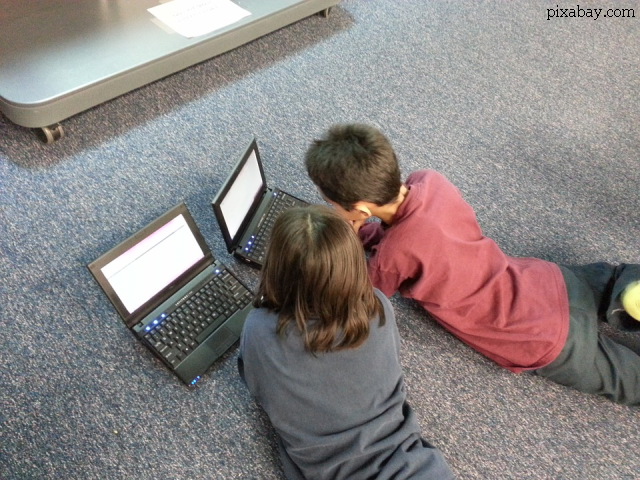SOCIETY TODAY
Children and the Dangers of the Internet

România Internațional, 07.08.2019, 15:40
According to a study run by the Save the Children Foundation, over a quarter of Romanian children spend over six hours on-line, but this percentage goes up over the weekend or on vacations. Here is sociologist Ciprian Gradinaru with a few conclusions:
“If we contrast with the previous studies, because this is a continuation of the studies run by Save the Children in 2013 and 2015, we notice that time spent on-line increases, while at the same time the age that children start spending time on-line decreases. One other conclusion is that children use more and more social networks, making public personal information; more than that, the number of social networks they go on is on the increase. If a few years ago most children use one or two social networks, nowadays they have accounts on four or five.”
The study shows that 73% of students use the Internet at school, while 32% use it furtively, during class. Also on the rise are cases of on-line bullying, with a higher percentage among high school students. 40% of children say that they surf the net very often without a clear aim, 13% did not eat or sleep in order to surf, and 24% feel restless and uneasy if they cannot access the Internet. According to the Save the Children study, young people who spend a lot of time on-line are significantly less satisfied with the relationship with parents, friends, and teachers, and their life in general. Day to day activities have less meaning, and they are less optimistic regarding the future. Here is biophysicist Virgiliu Gheorghe, who has a PhD in bioethics, and points out the negative effects on childrens emotional health:
VM; “First of all, the Internet creates addiction. It is a magical mirror that sparks the childrens curiosity. Childrens minds are open towards the new, they seek challenging experiences to develop their mind, and the screen is stimulating, it is a surrogate for reality that is more intense an experience than reality itself. They are attracted to them, they spend more and more time on screens, and addiction develops. Addiction, at first , is a decrease in the motivation to act in the real world, then a sort of depression emerges regarding real experiences as compared to the virtual experience, because the latter is highly exciting. Once the addiction sets in, the child is no longer comfortable in the real world, is sad, and their attention span decreases. Secondly, the screen has some advantages, in the sense that it changes lightning fast, the frames change extremely fast, so this aggression against the senses demands attention, it holds the attention, and this generates a kind of semi-hypnosis, which has been documented as far back as the 1970s. Any prolonged contact by the child, even if the message is harmless, leads to addiction, they want more, and more stimulation, like a drug.”
Research in the last few decades shows that exposure to screens in childhood is harmful to the development and functioning of the human brain. Attention, motivation, sensitivity, creative imagination, and most executive functions of the brain are affected in a major way. For a healthy education, biophysicist Virgiliu Gheorghe recommends excluding screens from the childs life, replacing them with affection, communication, sports, music, reading, and mathematics:
“Parents are fooling themselves if they think a computer increases a childs competencies, on the contrary, it decreases them. The people who work best with computers, who do good programming, are mathematicians, not children who have used computers since they were very little. That is because, in addition to addiction, screens involve a type of cortical activity that is not appropriate for the human mind. This produces changes in the brain. The brain of children born with computers around is not the same as children before this. Cortical atrophy occurs, and the density of gray and white matter decreases in the left pre-frontal lobe. These children are prisoners of virtual environments. There is no inclination towards reading other than on a screen. There are two types of people, with different brains, expectations, and behavior. We dont realize it, but education and elites have nothing to do with these things. Obamas daughters got smart phones when they were 16, and we already have children who get them when they are only a few years old. The poorer a country is, and going through a crisis, the bigger the consumption of media is. The high performance countries that lead the world, their elites, dont grow up like this. These are means of enslaving the mind and brainwashing, they are methods of mind control.”
Save the Children has been running since 2008 a unique European program, The Internet Hour, promoting the creative, useful, and safe use of the Internet, according to Teodora Stoica, a psychologist with Save the Children:
“The program has three major components. Basically, we organized information activities for several target groups, we do this for children and teenagers, as well as for parents, teachers, and experts who work with children. We have a counseling hotline for children and teenagers where they can call if they have problems or questions, and we also have a hotline for reporting illegal content. The moment someone encounters on-line harmful or inappropriate content, they report it to us, and we find a way of removing it from the Internet.”
Last year, as part of the Internet Hour project, 49,000 children and 12,000 parents and teachers got involved in educational activities, 718 children had the benefit of information and counseling, and over 1,100 complaints were registered by the reporting hotline.






























